Google AdSense has recently notified all its publishers to comply with the new EU user consent policy. The company published a blog revealing a new user consent policy and has emailed all publishers to comply with it as soon as possible.
Although the EU cookie policy has been in place since 26 May 2012 (see this official EU legal document as adopted on 2 October 2013), not many websites have taken it seriously.
This enforcement from Google AdSense, however, will compel nearly every Google AdSense publisher to adhere to the policy. Google has made changes to its own products and now urging its partners and publishers to comply with the policy.
If you too received that important email from Google AdSense earlier this week, don’t panic. There are simple solutions that you can implement within minutes to comply with the user consent policy.
EU user consent policy
First, what is the user consent policy anyway? As seen in the email sent to publishers below, it is a new policy about obtaining EU end-users consent that reflects regulatory and best practice guidance.
Website publishers using any form of cookies should clearly explain what cookies do (and why) and seek the consent of their EU-based users.
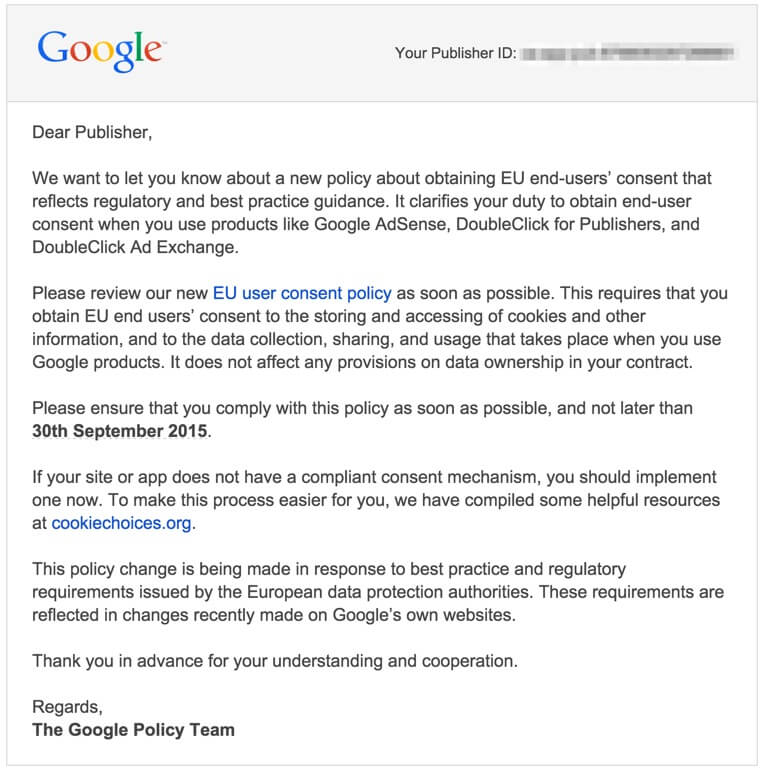
European Union laws require publishers to obtain consent from their users about their use of cookies. This includes all websites and apps that have users/visitors from the countries within the European Union.
As Google notes, the policy reflects the requirements of European privacy laws.
Google’s Adoption of EU Cookie Policy
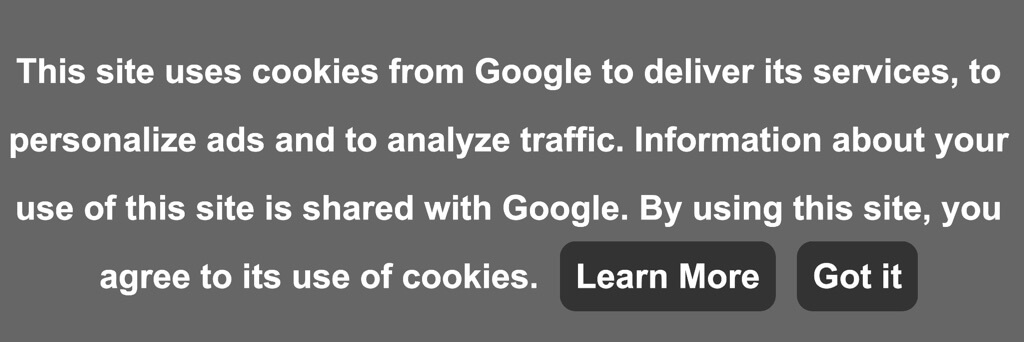
Google adhering to the EU Cookie policy means that its products are now following European privacy laws to seek consent from the EU end-users.
As the above email suggests, this requires publishers to obtain EU end users’ consent to the storing and accessing of cookies and other information, and to the data collection, sharing, and usage that takes place when you use Google products.
Most commonly used Google Ads products by website publishers include Google AdSense, DoubleClick for Publishers and DoubleClick Ad Exchange. All publishers using these products will now need to find a way to comply with the policy.
As per Google Ads, the deadline to comply with the policy is by 30th September 2015. Google Adsense has also published EU consent policy FAQs to help you understand the policy.
So, for those of us who use WordPress and Google products such as AdSense, here’re some solutions on how we can comply with the consent policy.
Disclaimer: I am not providing any legal advice and it’s always recommended to consult a legal expert in case you have any queries related to complying with the legislation.
Using WordPress Plugins for Cookie Policy Notice
For WordPress websites, there are a few plugins that can be used to inform users about cookies and gain consent to comply with the EU cookie law regulations.
1. Cookie Law Info Plugin

In a simple style to match your website, Cookie Law Info Plugin displays the required information to comply with the EU cookie policy.
Once installed and activated, the plugin adds a subtle banner in the header or footer header or footer displaying the compliance status regarding the EU Cookie Law.
The plugin also comes with advanced features such as making the cookie bar disappear after a few seconds or accepting cookies automatically on a scroll. The plugin description mentions that such an automatic feature is allowed under Italian law, but you might want to double-check or seek legal advice.
Here are some features of the Cookie Law Info plugin.
- Custom Styles – Fully customisable
- Auto-hide cookie bar after a few seconds
- Fully responsive cookie bar
- Cookie table to display used cookies on your website.
Once downloaded and installed, you can change the settings by navigating to Cookie Law Info > Cookie Law Settings
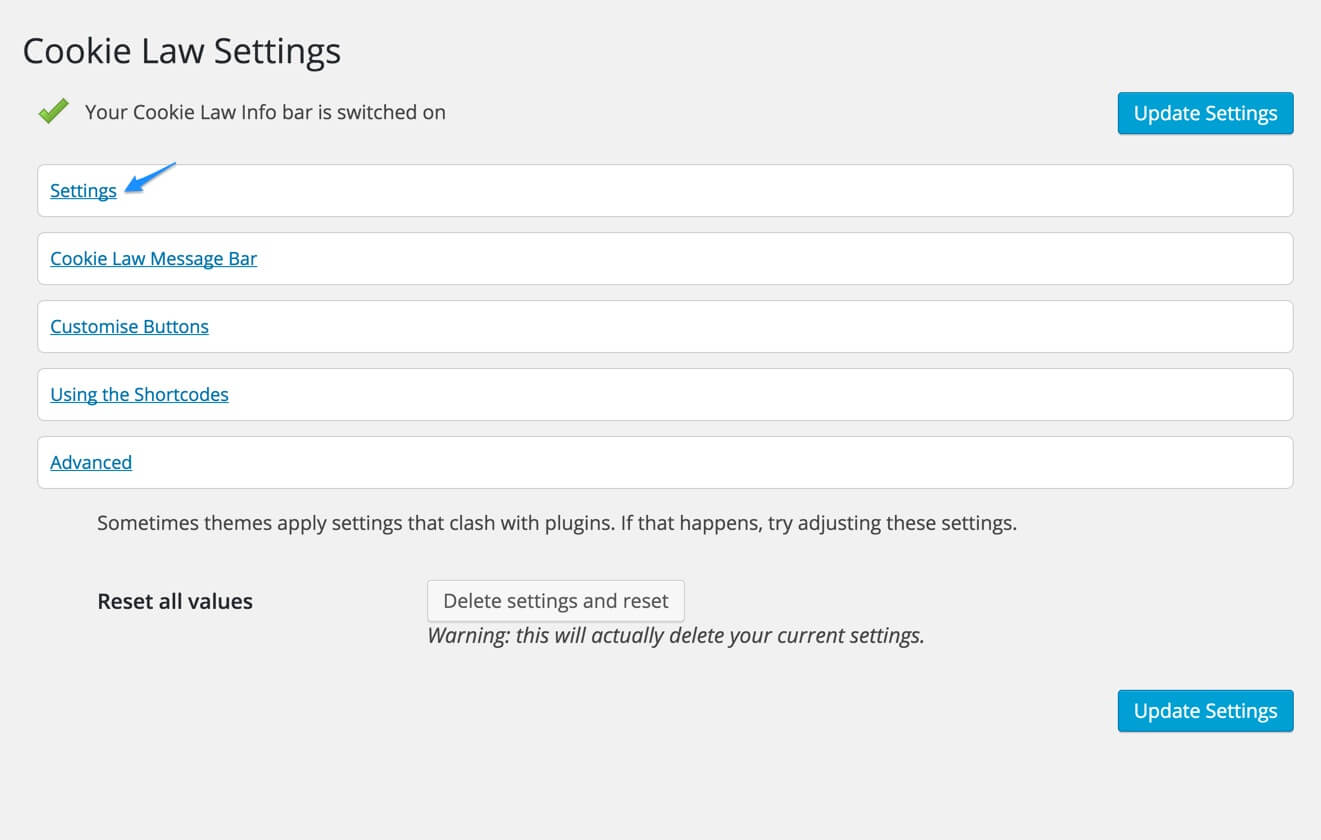
Cookie Law Info plugin is one of the most popular free plugins available on the plugins directory. More than 100K users have actively installed the plugin at the time of this writing.
The plugin author is also working on its premium version with upcoming features such as GeoIP included. That might be helpful to many cookie plugin users to just show the banner to EU visitors.
Live Preview | Download Plugin
2. Cookie Notice Plugin by dFactory
Cookie Notice by dFactory is another popular plugin available on the WordPress plugin directory to help you with the EU cookie policy.

The plugin comes with several features and has been translated into more than 15 languages. Publishers operating in different languages can easily benefit from the plugin. Here’re some features of the plugin.
- Customise the cookie message
- Redirect users to a specified page for more cookie information
- Set cookie expiry
- Option to accept cookies on scroll
- Option to set on scroll offset
- Option to refuse functional cookies
- Select the position of the cookie message box
- Animate the message box after the cookie is accepted
- Select buttons style from None, WordPress, and Bootstrap
- Set the text and bar background colours
- WPML and Polylang compatible
- .pot file for translations included
Once you have downloaded and installed the plugin, you can navigate to the settings page and configure the options that you want. This YouTube video makes it really easy to go through the settings of the Cookie notice plugin.
The plugin is frequently updated and has been actively installed by more than 90K users!
Live Preview | Download Plugin
3. UK Cookie Consent Plugin
UK Cookie Consent is another simple plugin that allows you to display a notification bar on top of your page seeking consent from the end-user.
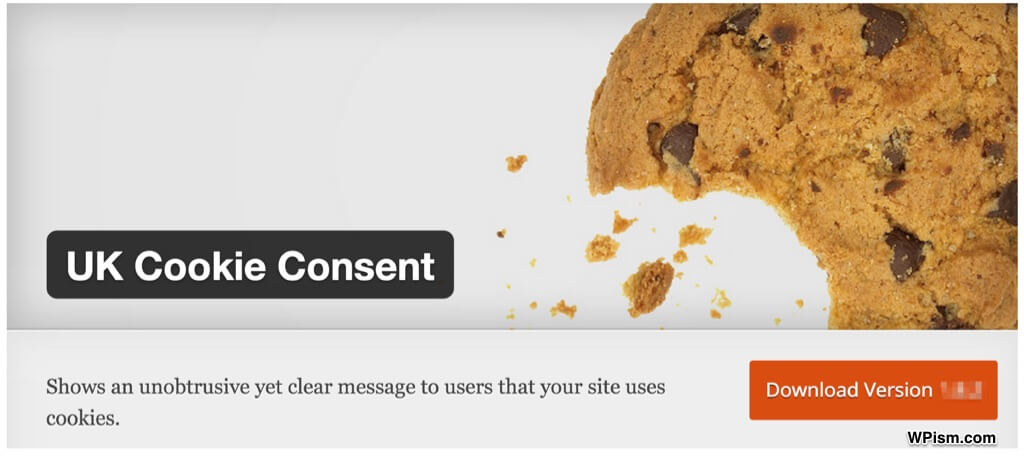
The notification bar also displays a link to the More info page that is generated automatically when you install the plugin. You can keep the page as it is or edit it further as per your requirements.
The information page pre-populated information on cookies and how to disable them can be pretty useful if you have no idea what information you should on such page.
Plugin authors note that the plugin provides you with the most effective way to comply with the UK interpretation of the EU regulations regarding the usage of website cookies. It’s also worth mentioning that this plugin doesn’t use the “explicit consent” approach and thus doesn’t disable cookies allowing users to continue browsing the website.
Once you have downloaded and installed the plugin, navigate to Settings > Cookie Consent to modify your settings.
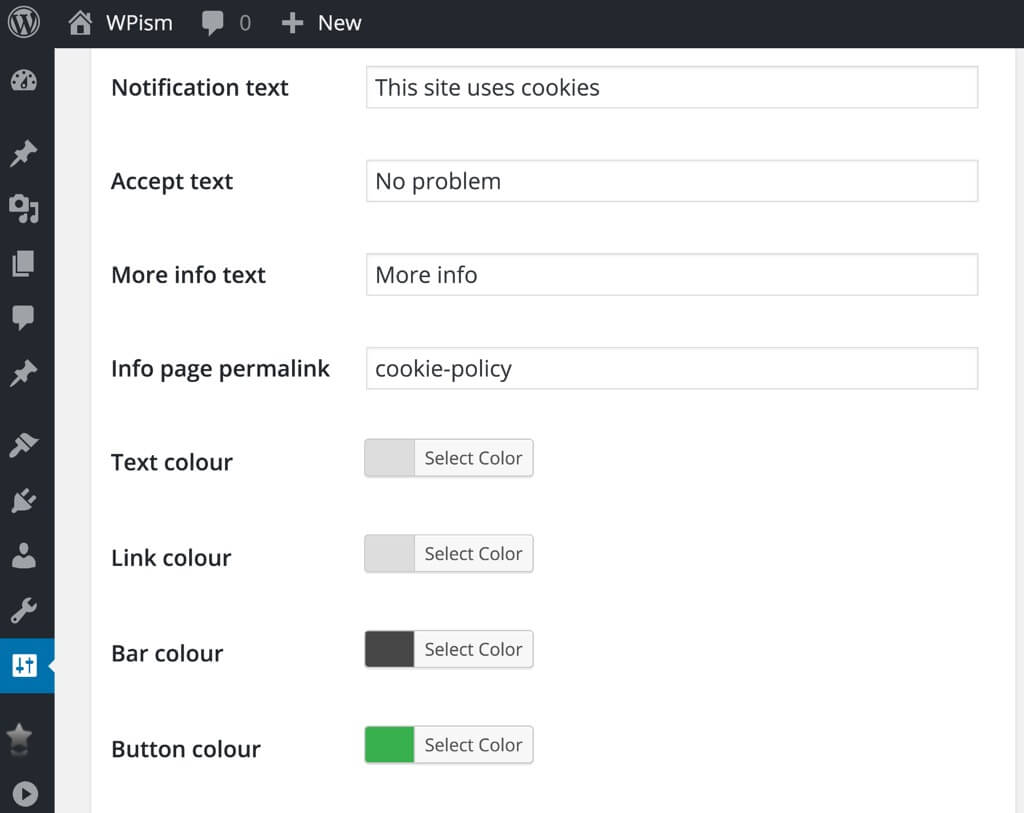
The plugin is pretty popular, as more than 50K WordPress users have actively installed it.
Live Preview | Download Plugin
4. Cookie Control Plugin
Cookie Control is yet another plugin for complying with cookie legislation. The plugin is developed by Civic UK and requires an API from their website to work on WordPress.
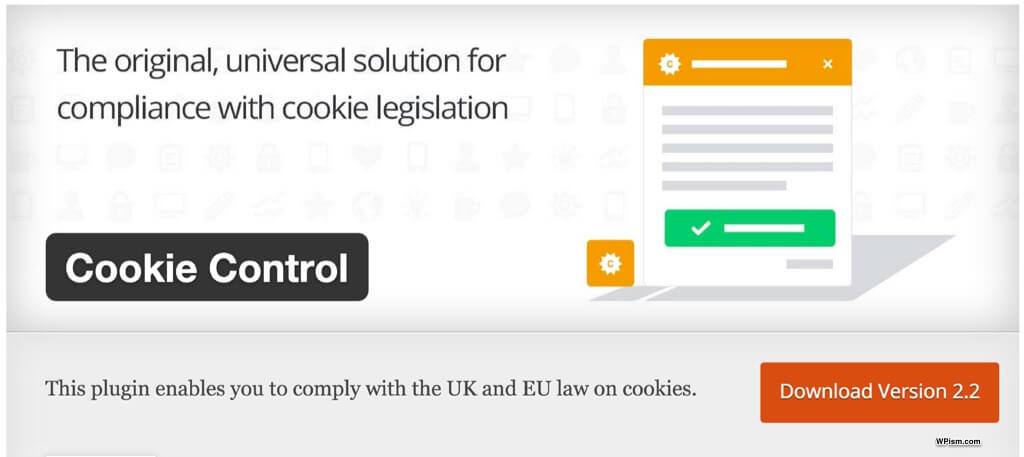
Civic UK has also developed the cookie control plugin for other CMS such as Drupal and Joomla. And thus the company claims Cookie Control to be the original, universal solution for compliance with cookie legislation.
The WordPress plugin, however, has some poor reviews on the plugin directory and has been actively installed by less than 10K users at the time of writing this.
The free version of the plugin includes configuration options for icon type and location, notification text, multiple consent models and SSL Support. There are other premium licenses available with several additional features.
Live Preview | Download Plugin
Premium Cookie policy Plugins
Free plugins listed above fulfil most of the required features and so I don’t see any reason why you would be looking for premium ones for this task.
But if you still don’t like designs or other elements and are looking specifically for premium plugins, here’re a few plugins that I explored during my research.
5. Cookie Info WP Plugin
Cookie Info WP is one of the simplest premium plugins providing you with the Cookie law compliance script. All you have to do is just install and activate the plugin.

The plugin, however, can be customised to meet your needs. There are basic and advanced settings available for the plugin.
Cookie Info WP Plugin is the most popular premium plugin available on CodeCanyon for the Cookie law. Here are some of the features of the plugin.
- Responsive Design
- Easy to Customise
- Lightweight
- Easy Install
- Multilingual Ready
Live Preview | Download Plugin
I mainly liked its live demo feature which allows you to preview how the plugin’s cookie bar looks on your live website. See the live demo screenshot for WPism showing the cookie bar below.
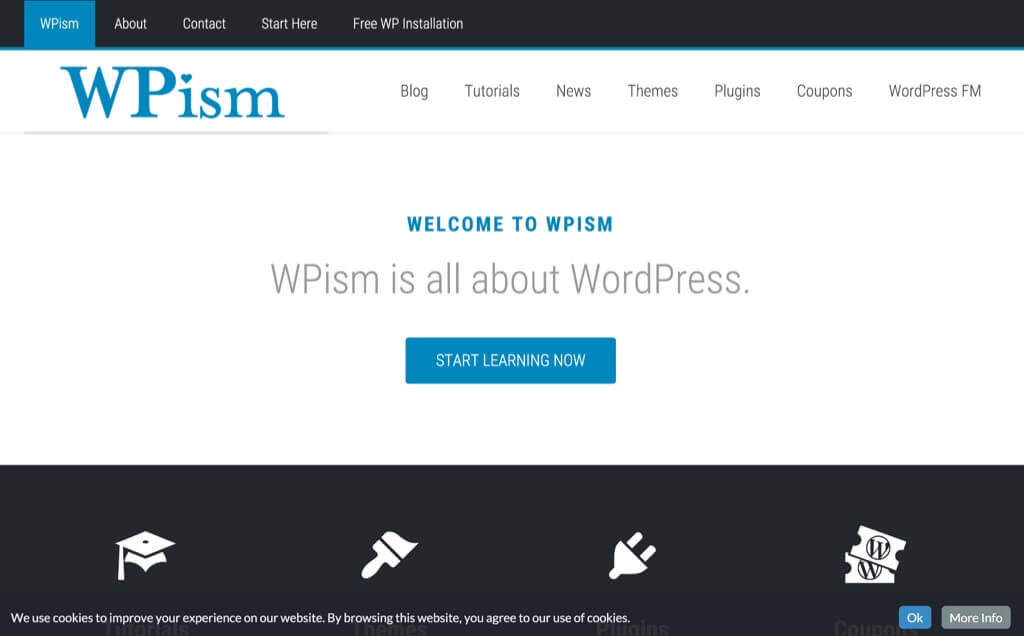
6. CookieCuttr – EU Cookie Law Compliance Plugin
Packed into a WordPress plugin from a popular script, CookieCuttr is a simple yet feature-rich premium plugin available on CodeCanyon. The plugin promises a fully compliant solution for the EU Cookie policy legislation.
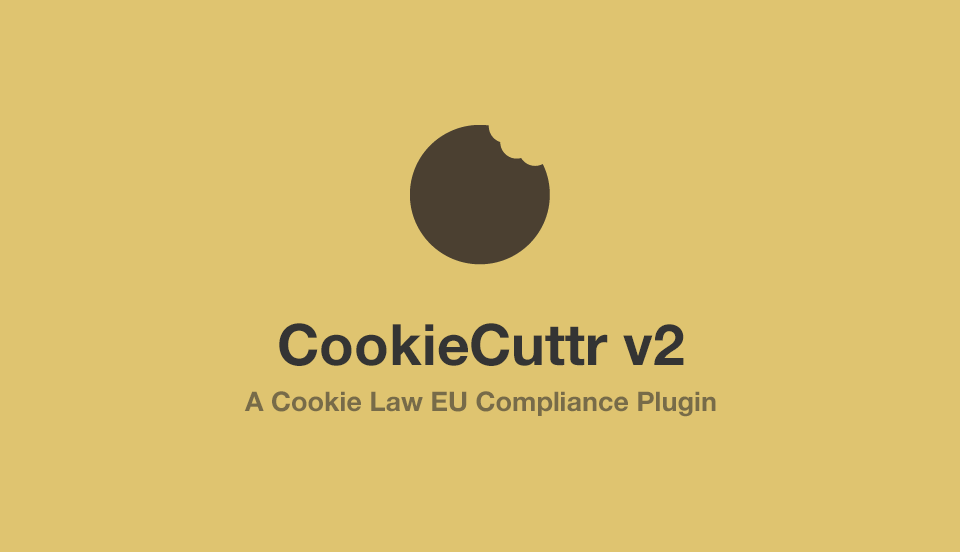
The plugin also adds advanced options such as disabling Google Analytics until the visitor has accepted cookies or disabling other cookie-using elements on the website with a friendly message.
CookieCuttr is also multilingual and includes .po/.mo files making it possible for localization into different languages.

The cookie bar looks clean and modern, but you might want to check out the live preview of the plugin to see if you really like the design.
Live Preview | Download Plugin
Your Views on EU Cookie policy?
I hope the selection of plugins helped you implement some solutions to comply with the overall EU cookie policy and the EU user consent policy of Google Adsense.
What do you think of this new policy? Which plugin did you choose to use? Let me know in the comments below.
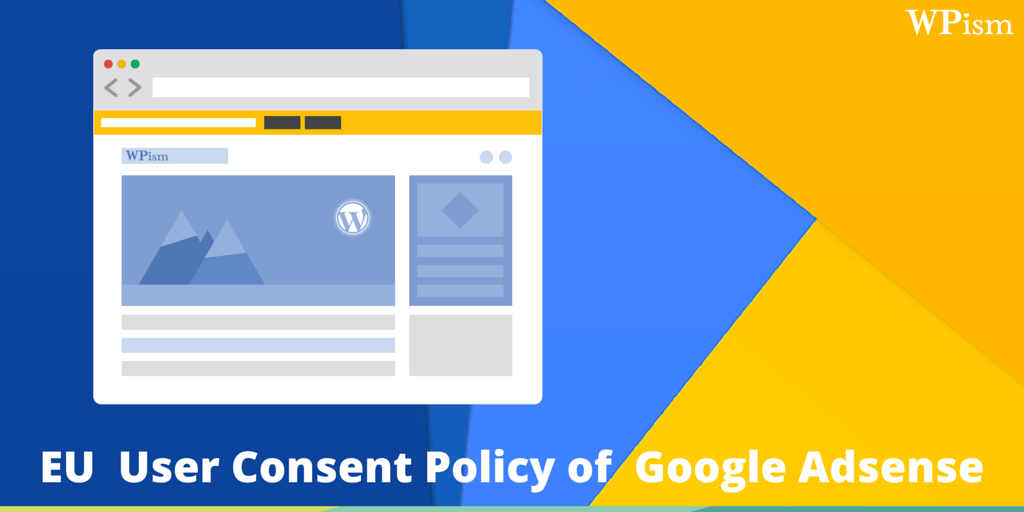
All those plugins seem to only inform the user – not seek consent.
What to do if the user doesn’t consent to accepting cookies from your site? Are you allowed to show an adsense ad before the user agrees to cookies?
Hi Oliver
Most of the above plugins do seek consent and have options for seeking “explicit consent” approach and thus disable cookies allowing users to continue browsing the website.
The whole point of seeking consent is that if the user doesn’t allow accepting cookies, then h/she shouldn’t be seeing any cookie-using-elements.
For example, the CookieCuttr plugin as mentioned above adds advanced options such as disabling Google Analytics until the visitor has accepted cookies or disabling other cookie-using-elements on the website with a friendly message.
I guess you are allowed to show the AdSense ad before the user makes any decision.
Let me know if I can be of any further help.
My problem is that Google does not clearly state what they expect me to do.
When I go to their blogpost on https://adsense.blogspot.ie/2015/07/introducing-new-user-consent-policy.html I see the cookie-consent-message on top of the page. Meanwhile I already got 5 cookies from them. So what’s the point really?
Is there a way to implement Adsense ads for non-cookie-consenters or do I have to remove it for them? Who can say?
That’s true, they haven’t mentioned clearly what can be done apart from just asking to comply with the law.
Depending on your website and business, I don’t think you need to take the “explicit consent” approach (You can see from what Adsense is doing). I, however, recommend seeking legal help if this is something you are really concerned about.
I don’t think there’s a way to display Adsense ads without making use of cookies.
Don’t users have control over cookies and third-party cookies via browser settings?
I’ve seen these notices on some websites in the last few months and I wonder what the reason for the laws are. It seems like something users already have control over.
Absolutely Steven! Users can control this from their browser settings, one reason why the Law is really stupid. It just messes the UI and might affect revenue of several publishers.
Not many websites had taken it seriously (apart from big and corporate ones) but this enforcement from Google Adsense will compel many publishers to comply with it.
Yes, I agree that this law is really stupid since people have the ability to turn cookies off in their browser. I have several websites that are not wordpress sites. I am clear on how to implement code telling people my site uses cookies, but don’t know how to turn them off if the user refuses them. How do I do that?
BTW, it’d be handy if you added a checkbox to your comments so non-regular readers like me can get an email notification of replies (I use Jetpack for that).
Thanks.
Thank you for your comment and suggestion Steven. Really appreciate it.
I have added that now!
The problem is getting consent BEFORE placing cookies. Information is not enough.
As far as I know there is no way to use adsense without cookies, aka call the adsense script with a flag ‘no-cookies’.
That google requires the eu-consent is OK, but they should provide a technical solution as well. On there cookie info page they even write down ‘every provider will have a solution’, but google doesn’t just writing a lot of confusing text.
what is ‘commercial reasonable’ for example, I have a couple of euro a day website with a lot of single page visitors ( it has good information so users won’t need to browse on) so I will loose most income with any kind of ‘consent before add’. So for me it’s not commercial reasonable and I can omit the consent???
Google is just covering their ass,
That’s a fair analysis, Bram. I agree they are just trying to show that they agree with it.
Google has added the consent automatically with all blogger powered websites, I guess that’s the technical solution they have provided.
They also launched a website last month – https://www.cookiechoices.org/ to help publishers with cookie consent. On the website, they link to few providers mentioned above in the post along with some code and guidelines of implementing it in ios and Android Apps. But yeah they could have done more helping with all AdSense publishers.
I strongly agree with your view of Impact this could have!
That’s the news but is there any technical solution provided by adsense or specially from Google or the publishers getting any kind of problem.
Over all its nice that you came up with some nice solutions and nice post.
Hi Rajeev
Thank you for the compliment.
As per for your first part of the question, I have seen Google has already added the consent notification bar in their publishing platform – Blogger. So, all blogger powered blogs automatically display the consent when served from EU locations.
For WordPress, plugins are the way! (I wish Google had helped with that as well but again the community has given us so many good and free plugins as listed above).
For ios and Andoird Apps, Google has published necessary helpful code under Creative Commons Attribution 3.0 License that might help several developers.
More about on Google’s own website here – https://www.cookiechoices.org/
My understanding is all other platforms do have something in place already.
From my understanding you do not need to use any of the plugins you have suggested…
You need to relies the term “consent” doesn’t mean they have to physically click a button. The user IS consenting by continuing to browse your site.
If they do not agree with your cookie policy then it is up to them to remove themselves from the site. Everyone here is panicking about what if I user clicks “Deny” but the fact of the matter is, there should not be a deny if any.
This is why you see fairly large sites only say “okay” or “Read more” there is never a “Deny” option because if you clearly state this in your cookie policy then it is all above board and legal compliant.
All a user needs is a message that can be visible somewhere on their site which states “we use cookies”. Their continued browsing is consent.
I really feel as if you should update your article to point this out
Hi Daniel
That’s a good point. I agree with you that we don’t need to seek any explicit consent as few plugins mentioned above allow for that.
Now the question is how do that consent as required by law? – “require that consent be obtained.”
If you look at how Google itself has implemented the consent in its blogger powered websites;
“This site uses cookies from Google to deliver its services, to personalize ads and to analyze traffic. Information about your use of this site is shared with Google. By using this site, you agree to its use of cookies.”
with two buttons;
LEARN MORE GOT IT
So, yes like you have mentioned, there’s no need of “Deny” option and I guess users can control that from browser if they really need to.
The important point from the legal requirement is to display the information and “obtain consent”.
Okay, thanks for this bit of information. I’ll get right on implementing this on my websites. Thanks so much for your post.
I use AdSense on my site but never received this email from Google about the cookies. Could it be because I have an active Privacy Policy link at the bottom of every page?
Hi Tori
Is your email address updated with Google Adsense account? I am sure they didn’t just send it to the EU publishers.
Having an active Privacy Policy link shouldn’t matter to Google.
Anyway, the official blog post (https://adsense.blogspot.co.uk/2015/07/introducing-new-user-consent-policy.html) is also an authentic source of information and the email was just to spread the information.
The email as you can see in the screenshot above wasn’t specific to publisher apart from mentioning their Publisher ID.
Yes, my email is updated with Google. I found out about the cookie thing from a blogger who was talking about it. I guess I’m just curious as to why I didn’t get the email or why Google hasn’t put a big notification about it on our AdSense homepages!
I agree. They should put a big notification if it is really that important! I guess they will do it nearer to the deadline.
But hey, have you checked your messages directly in your Google Adsense dashboard? (This links should directly take you to your messages)
Or click on the notifications icon on top right corner and it should have your messages there.
I have checked that multiple times and still nothing 🙁
Hey Guys,
I know we are all paying close attention to Google’s new Cookie Consent Policy which now requires all publishers using AdSense to obtain visitor permission prior to collecting/using their data.
Just wanted to offer quick reassurance that compliance doesn’t need to take more than a few minutes!
Once activated, our Cookie Consent Banner tool proactively notifies your site’s visitors that it uses cookies, and asks for visitors’ consent all in one clean, intuitive step.
Where most services are all or nothing: on or off, ours offers geo-targeting, and the option to personalize your banner’s message. The solution is entirely free, works seamlessly on mobile, and a breeze to install on any site!
Hoping this helps to relieve any anxiety around the new requirements, and lets folks get back to enjoying the power of Adsense’s features.
All the best,
thank! very helpful and exhaustively. I used your methods
Thanks Tim. Glad that it helped!
I have to implement in my android application that use adsense to monetization?
Hi Donpablo,
Yes, that’s what the guidelines state. You can find some helpful code both for your android application on this page – https://www.cookiechoices.org/
Navigate to the ios/Android code section on the page.
i have made a mistake the app is a game it onli store the score on the phone for users have share button and twitter and use admob.
Did you know websites exist that don’t use WordPress? Nice solutions for one group of webmasters. Your title is wrong. It doesn’t tell ME how to comply. It tell WP users how to comply. If you think your URL is enough of an indicator that this is just WP related…wrong.
Hi Doug,
Thank you for your comment. Yes, I know WordPress only powers 25% of the web.
I completely agree with you that this only provides solutions to WordPress users. That’s what we are passionate about, here at WPism – helping WordPress users.
We write content with our audience in mind and it won’t take you long to figure out this blog is targeted to the WordPress community.
But hey if there’s any other platform you need help with, let me know and I should be able to help you. Here’s more for popular platforms:
For Blogger Users: Blogger automatically adds the notification (you can further customise it editing the HTML code). More information in blogger help forum – https://productforums.google.com/forum/#!topic/blogger/_YGz8o6wwks
For Drupal Users: Here’s the EU Cookie Compliance module that you can use – https://www.drupal.org/project/eu_cookie_compliance
For Joomla Users: Here’s one of the popular extensions – https://extensions.joomla.org/extension/eu-e-privacy-directive
I could go on but I would never be able to cover all platforms and CMS. So, if there’s any specific platform you need help with, please let me know!
The funniest thing is that this site wpism.com doesn’t show Cookie Consent message to me (I’m from EU) and is showing adsense ads at the same time.
Hi Alex,
I had temporarily disabled to debug few things! I use the Cookie Law Info plugin and it should be up now!!
thanks for tutorials
Now using jetpack we can add Cookie consent banner on wordpress site and it is too easy.